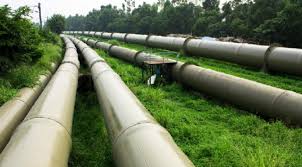Business
Lawmakers Sue Bankole, Clerk Over Unpaid Allowances
Five members of the House of Representatives last Wednesday instituted contempt charges against Speaker Dimeji Bankole and the Clerk for non-payment of their salaries and allowances as directed by the court.
The lawmakers are Reps Dino Melaye, (PDP-Kogi) Independence Ogunewe, (PDP-Imo) Solomon Ahwinahwi, (PDP-Delta) Bitrus Kase (PDP-Plateau) and Abbas Anas (PDP-Jigawa).
The lawmakers had on December 2, through a Federal High Court Judgment in Abuja got their indefinite suspension by the House quashed and returned to their seats after six months.
They, however, returned to court last Wednesday following the failure by the House leadership to pay them their entitlements.
The lawmakers in an affidavit sworn to on their behalf by Rep. Dino Melaye at the Federal High Court, Abuja, urged the court to commit Bankole and the Clerk of the House to prison for refusing to pay them.
Melaye said that the affected lawmakers had returned to the parliament to continue with their legislative duties, but that the Speaker had refused them access to their offices.
He alleged that the Speaker and the Clerk had broken into their offices while they were away, removed their properties without their consent and reallocated them to other lawmakers.
Melaye reminded the court that the duo were forced by the court to comply with its ruling that the lawmakers should return to parliament, through the issuance of Form 48.
According to Form 49 (Pursuant to Order IX Rules (13) of the Judgment and Enforcement Rules) issued by the Court following the application by Melaye and his colleagues, the Speaker and the Clerk might be committed to prison, if they fail to comply with the court order before January 12, 2011.
“Take Notice that the Plaintiffs/Applicants will on Wednesday the 12th day of January 2011 at the Hour of 9’O’Clock in the forenoon apply to this Court for an order for the committal to prison of the 1st and 3rd Defendants.
“For having disobeyed the judgment of this Honourable Court made on 2nd of December 2010, nullifying the suspension of the plaintiffs/Applicants as they have refused to pay them their outstanding salaries and allowances accrued to them since the 22nd of June, 2010, till date.
“And for their refusal to return the Plaintiffs/Applicants Offices to them which the 1st Defendant/Contempnors illegally broke into and reallocated same to other legislators after they were illegally suspended from the House of Representatives and Restrained from performing their legislative duties.
“And take Further Notice that the 1st and 3rd Defendants/Contempnors are hereby required to attend the court on the date first above mentioned to show cause why an order for committal to prison should not be made,” it said.
In a reaction, Rep Eseme Eyiboh, Chairman, House Committee on Media and Public Affairs, said the payment of allowances to the affected lawmakers was the business of the National Assembly management and not that of the House leadership.
Eyiboh said the judgment had been appealed against and that there was no way the Speaker and the clerk could be charged for contempt.
Meanwhile the House had recalled 10 of the 11 members suspended on June 22, 2010, following a fracas.
Among those pardoned are Reps Gbenga Oduwaiye (PDP-Ogun), Austin Nwachukwu (PDP-Imo), Gbenga Onigbogi (PDP-Osun), Ehiogie West-Idahosa (PDP-Edo) while Doris Uboh (PDP-Delta) got her recalled through court judgment.
The only member who had refused to neither beg for pardon nor go to court was Rep kayode Amusan (PDP-Ogun).
Business
Indigenous Refineries To Buy Crude Oil In Naira, Dollar -FG

The Federal Government on Monday complied with the demands of domestic crude oil refiners and other operators in the sector with a declaration that indigenous refineries can now buy crude oil in naira or dollars.
At a briefing in Abuja, where it unveiled the new template for domestic crude oil supply obligation, the Government, through the Nigerian Upstream Petroleum Regulatory Commission (NUPRC), also disclosed that the total crude oil and condensate reserves in Nigeria increased to 37.5 billion barrels as of January 1, 2024, with a life index of 68.01 years.
It stated that in compliance with the provisions of Section 109(2) of the Petroleum Industry Act 2021, the NUPRC in a landmark move, had developed a template guiding the activities for Domestic Crude Oil Supply Obligation.
The Chief Executive, NUPRC, Gbenga Komolafe, told journalists in Abuja that “The commission in conjunction with relevant stakeholders from NNPC Upstream Investment Management Services, representatives of Crude Oil/Condensate Producers, Crude Oil Refinery-Owners Association of Nigeria, and Dangote Petroleum Refinery came up with the template for the buy-in of all.
“This is in a bid to foster a seamless implementation of the DCSO and ensure consistent supply of crude oil to domestic refineries”.
On the currency of transaction for crude oil purchase, as approved in the new template, Komolafe stated that it would be either in naira or dollar, adding that naira transactions would free the pressure on the country’s foreign exchange rate.
The NUPRC boss also noted that the template had become effective because all necessary parties had signed up for it.
“The PIA intends to make the implementation (of crude oil obligation) very easy for the parties, both for the producers and refineries. So the answer simply is that the currency for the transaction would either be in naira or dollar. That is the simple answer.
“But we all know that if the transaction is carried out in naira, that itself will free the pressure on the exchange rate. That will help the exchange rate. So that is the intent and besides, the overall intent of the Petroleum Industry Act is to develop our midstream, which is a very laudable provision of the PIA”, he said.
In the currency of payment section of the new template, it was stated that “the payment shall be in either United States dollar or naira or both. Where the payment is in both currencies, the payment split shall be as agreed in the SPA between the producer and the refiner”.
On February 26, 2024, The Tide’s source exclusively reported that modular refineries in Nigeria were facing the threat of shutting down operations following their inability to access foreign exchange for the purchase of crude oil, a commodity priced in United States dollars.
Nigeria has 25 licenced modular refineries with a combined capacity of producing 200,000 barrels of crude oil daily.
Although not all of the plants are currently operational, the report stated that the functional ones were increasingly finding it difficult to purchase crude due to the foreign exchange crisis in the country.
The facilities, which produce Automotive Gas Oil, popularly called diesel, Dual Purpose Kerosene or kerosene, naphtha and black oil, were finding it hard to make the refined products available to oil marketers for distribution to consumers.
Operators of the plants explained that the scarcity of dollars had made it almost impossible for dealers to purchase crude oil, as the modular refinery players and oil marketers demanded the sale of crude oil in naira from the Federal Government.
The modular refinery operators, who spoke under the aegis of the Crude Oil Refinery Owners Association of Nigeria, lamented at the time that the Federal Government had not been able to keep its part of the bargain concerning the provision of feedstock to local crude oil refiners.
The Publicity Secretary, Crude Oil Refinery Owners Association of Nigeria (CORAN), Eche Idoko, had stated that modular refineries might close shop if nothing was done to ameliorate the situation.
CORAN is a registered association of modular and conventional refinery companies in Nigeria, while modular refineries are simplified refineries that require significantly less capital investment than traditional full-scale refineries.
Business
GEIL, NCDMB Train Nigerians On Oil, Gas Engineering

In compliance with the Nigerian Oil and Gas Content Development Act, Green Energy International Limited (GEIL), the operator of Otakikpo Marginal Field OML 11, Lekoil Oil and Gas Investment Limited (JV) in partnership with the Nigerian Content Development and Monitoring Board (NCDMB) has commenced the training of several Nigerians on oil and gas engineering.
The training is aimed at closing the skill gap in the oil and gas industry, with focus on the engineering sector, and is expected to deliver the required skill set necessary to meet the growing demand within the sector.
Speaking at the maiden edition held in Yenagoa, Bayelsa State, the Government Relations Manager at GEIL, Fatimah Mohammed Amate, noted that “The training will be delivered by Dexterous Applied Training Institute and will target several Nigerians from across various geo-political zones, and participants will be trained in the areas of Piping Engineering, Safety Engineering, Electrical Engineering, Health and Safety at the work place, Nigerian content awareness, among others”.
Also commenting, HRH Spriff Serena-Dokubo and Dr. Lyb Udochu, both Directors at GEIL, noted that the company’s commitment to the development of the oil and gas industry cannot be over emphasised.
According to HRH Serena-Dokubo, “The top five performing trainees will be offered employment immediately after the training”.
He further commended the leadership of the NCDMB for their coordination and synergy with GEIL towards the success of the training.
In his remarks, Dr. Lyb Udochu encouraged all participants in the programme to take the opportunity offered by the company seriously, adding that “over the years, GEIL hasensured that its core thematic areas are geared towards providing direct social investment programmes to address development deficits through employment, training and retraining, empowerment of women and youths, capacity building and skill acquisition, health outreaches, scholarships and direct community contracts”.
One of the beneficiaries of the training, Chimaobi Nwachukwu, highlighted the importance of the training, confirming that it would equip them with the competitive advantage necessary to excel in the oil and gas sector.
He said, “From my point of view, the programme would provide us with the required skill to be employable in the oil and gas industry and be more valuable to the society”.
Business
Nigeria’s Oil Reserve Grows By 1.4% To 37.5bll Natural Gas By 0.5%

The Nigerian Upstream Petroleum Regulatory Commission (NUPRC) has said Nigeria’s oil and gas reserves grew marginally in 2023 by 1.4 percent and 0.5 percent respectively.
NUPRC, in its annual national petroleum reserves position report, disclosed that as at January 1, 2024, revealed that oil reserves stood at 37.50 billion barrels compared to 36.966 recorded on January 1, 2023.
The reserve is made up of crude oil at 31.56 billion barrels and condensate oil at 5.94 billion barrels.
For natural gas, the Commission said reserves stood at 209 trillion cubic feet as at January 1, 2024, compared to 208.83TCF recorded over the corresponding period last year.
The gas reserve is made up of 102.59TCF of associated gas and 106.67TCF of non-associated gas.
At a press briefing in Abuja, the Chief Executive, NUPRC, Engr. Gbenga Komolafe, explained the growth of oil and gas reserves came from the contributions from the development of brown fields which were given out through the marginal field awards.
On the move to ensure that domestic refineries have enough crude oil for refining, Komolafe said a new template for domestic crude oil supply obligations has been released and has also become effective.
He stressed that with domestic crude oil supply obligations in place, he expects Nigeria to become self-sufficient in the supply of petroleum products when the Dangote and NNPC refineries come on stream fully in the second of the year.
“The strategic initiative aligns with the policy of the current administration and the declaration of President Bola Ahmed Tinubu that Nigeria is ready for business. Mr. President, as part of his fiscal policy, vacated barriers to investment in the oil and gas sector.
“Furthermore, this aligns with Nigeria’s commitment to bolstering domestic refining capacity and ensuring the sustainability of its oil industry.
“The template provides a transparent framework aimed at fostering collaboration among stakeholders for a thriving energy sector”, he said.
He disclosed that the template resolved about ten issues affecting crude supply to local refineries including load allocation and currency of payments.
Komolafe explained that the currency of payment will be mixed, adding “(a) the payment shall be in either United States Dollar or Naira or both, (b) where the payment is in both currencies, the payment split shall be as agreed in the SPA (Sales and Purchase Agreement) between the Producer and the Refiner”.
-

 News3 days ago
News3 days agoMonarch Lauds Fubara Over Road Project
-

 Politics3 days ago
Politics3 days agoFubara’s Victory Thanksgiving: Semenitari Challenges Okocha Over Funding Allegation
-

 Nation3 days ago
Nation3 days agoAnglican Bishop Urges Politicians To Lead With Integrity
-

 Oil & Energy3 days ago
Oil & Energy3 days agoPETAN Moves To Boost Oil Production
-

 World3 days ago
World3 days agoSouth Korea’s President Promises Changes Amid Poor Showing At Polls
-

 Politics16 mins ago
Politics16 mins agoNew SIM Support Group Inaugurates State Officials
-

 Education3 days ago
Education3 days agoCovenant University Retains Nigeria’s Best Varsity Ranking
-

 Sports3 days ago
Sports3 days agoHFN Sets Deadline For League Registration

